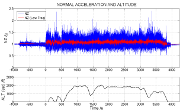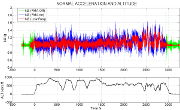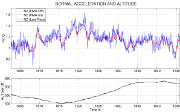|
Dr Steve Reed1 and Wendelin Egli2
1 Defence Science and Technology Laboratory, UK Ministry of Defence, www.dstl.gov.uk
2 MSR Electronics GmbH, 8444 Henggart
During the aircraft design process the designer must make assumptions about how an aircraft is going to be used in order to anticipate the static and fatigue loads the aircraft will be subject to. For military aircraft this will often include experience from previous aircraft types, undertaking similar roles or functions, and anticipated future roles for the aircraft.
When the aircraft enters military service it is essential that these structural usage assumptions are validated to assure the structural integrity of the aircraft. In the United Kingdom Ministry of Defence (UK MOD), this validation is regulated by the Military Aviation Authority (MAA).
However, traditionally such validation programmes have been costly and with the ever-growing pressure on defence spending across western governments, it is essential that minimum-cost solutions to meeting these requirements are developed. With this intention, the UK MOD’s Defence Science and Technology Laboratory (Dstl) has, with MOD Aircraft Project Teams and Defence Contractors, undertaken a range of laboratory testing and flight trials using the Modular Signal Recorder® data logger, manufactured by MSR Electronics GmbH, and supplied by Caption Data Limited, to capture basic structural usage information on several aircraft fleets.
 The MSR165 was purchased for this task because it is small, light, battery powered (which reduces the aircraft integration task), flexible and affordable. The MSR165 units used contain a 3-axis accelerometer, pressure, temperature and relative humidity sensor. The MSR165 was purchased for this task because it is small, light, battery powered (which reduces the aircraft integration task), flexible and affordable. The MSR165 units used contain a 3-axis accelerometer, pressure, temperature and relative humidity sensor.
The primary data used for assessing the structural usage of the fixed-wing aircraft is normal acceleration (NZ). In addition, the pressure data are used to estimate the altitude of the aircraft during flight and help identify take-off and landing events, as the MSR165 units are located in un-pressurised areas of the aircraft.
MSR165 Data Loggers remain fully autonomous for up to 75 flying hours or 2 months
   For such programmes to be successful it is essential that burden on technicians maintaining the aircraft operationally is reduced to a minimum. Therefore, the MSR165 units have been configured so that they record accelerations at 50 samples per second automatically from engine start until engine shut down. In addition, pressure, temperature and relative humidity data are captured at one sample per second continuously. This configuration allows the MSR units to be fitted by the aircraft technicians and remain fully autonomous for up to 75 flying hours or 2 months. Typical illustrations of the normal acceleration and estimated altitude, from the pressure data, from two different aircraft are reproduced in Graph 1 and Graph 2 and a close-up plot (40 seconds) is reproduced in Graph 3. After 75 flying hours of 2 months the MSR units are replaced by the technicians and the removed MSR is sent back to Dstl for analysis and comparison with design assumptions, fatigue test spectra or previous in-service usage. The acceleration data, captured at 50 samples per second is passed through a low-pass finite impulse response frequency filter set at 11Hz and 1Hz. This allows the data to be compared with information recorder using a Royal Aircraft Establishment (RAE) fatigue meter (which had an 11Hz bandwidth). In addition, the 1Hz low-pass data is used to identify the manoeuvre content in the signal (red line on the plots). For such programmes to be successful it is essential that burden on technicians maintaining the aircraft operationally is reduced to a minimum. Therefore, the MSR165 units have been configured so that they record accelerations at 50 samples per second automatically from engine start until engine shut down. In addition, pressure, temperature and relative humidity data are captured at one sample per second continuously. This configuration allows the MSR units to be fitted by the aircraft technicians and remain fully autonomous for up to 75 flying hours or 2 months. Typical illustrations of the normal acceleration and estimated altitude, from the pressure data, from two different aircraft are reproduced in Graph 1 and Graph 2 and a close-up plot (40 seconds) is reproduced in Graph 3. After 75 flying hours of 2 months the MSR units are replaced by the technicians and the removed MSR is sent back to Dstl for analysis and comparison with design assumptions, fatigue test spectra or previous in-service usage. The acceleration data, captured at 50 samples per second is passed through a low-pass finite impulse response frequency filter set at 11Hz and 1Hz. This allows the data to be compared with information recorder using a Royal Aircraft Establishment (RAE) fatigue meter (which had an 11Hz bandwidth). In addition, the 1Hz low-pass data is used to identify the manoeuvre content in the signal (red line on the plots).
This programme has been extremely successful and flight trials have been undertaken to date on two small UK MOD fleets (Islander and Defender) and two historic aircraft platforms ( Battle of Britain Memorial Flight Lancaster and the Royal Navy Historic Flight Swordfish). Nearly 100 hours of flight data have been captured during these trials and a range of further investigations have been possible using the data captured. Currently, several fleet-wide modifications and further trials are being planned.
   
Biography
 Dr Steve Reed is a Fellow of Ageing Aircraft and Structural Integrity at the UK MOD Defence Science and Technology Laboratory. He is a Chartered Engineer (CEng), a Fellow of the Royal Aeronautical Society (FRAeS) and a Visiting Fellow at the University of Sheffield. He holds a Batchelor of Science Degree (BSc) in Aeronautical Engineering, from the City University, London, a Master of Science Degree (MSc) in Aerospace Vehicle Design from Cranfield University and a Doctorate (PhD) in Mechanical Engineering from the University of Sheffield. Dr Steve Reed is a Fellow of Ageing Aircraft and Structural Integrity at the UK MOD Defence Science and Technology Laboratory. He is a Chartered Engineer (CEng), a Fellow of the Royal Aeronautical Society (FRAeS) and a Visiting Fellow at the University of Sheffield. He holds a Batchelor of Science Degree (BSc) in Aeronautical Engineering, from the City University, London, a Master of Science Degree (MSc) in Aerospace Vehicle Design from Cranfield University and a Doctorate (PhD) in Mechanical Engineering from the University of Sheffield.
|